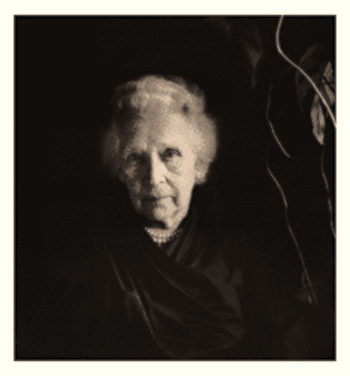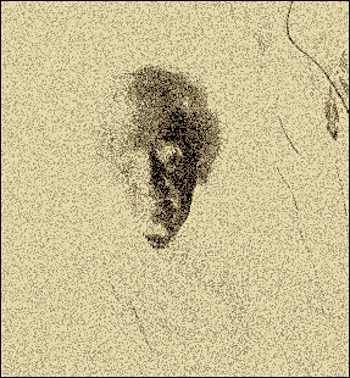Stories
Corinna Vallianatos
(Massachusetts)

Her young nephew Fellow visits on occasion, takes her out to the park so she can still be part of the world, but then back in the nursing home, she thinks, "Living a long time solves only one of life's mysteries, and that is what it is like to be very old." She still likes sitting on the park bench looking at the young women there in Yellow Springs, near the college.
She has, apparently, in her near-century of living, only loved women. She still likes watching the youngsters, "I imagine that beneath the flannel and military trousers of these young ladies there might be something pleasing, and that imagining occupies me." Fellow doesn't want to hear it. She tries to tell him of her first kiss,
- Mouth sodden with lipstick, ruffled blouse wrenched loose from the waistband of my skirt. Sweet instigator.
"What was the good girl's name. We were reading poetry together. Sappho. What I, in my heart's madness, most desire..." Genevieve also wants a martini.
Envelopes continue to come from Margaret, and Genevieve goes through the motions of living in this miserable nursing home. They bring her "coffee and a bib ... although a biscotti would have been more welcome." She watches the young girl who is cleaning the floor, peers at "the V shape of her underwear," thinks, "I wonder what color it is." But then,
- There is never anything to say until it's the wrong time to say anything.
One day she runs away from the home, falls down on a nearby grass plot, wets herself, begins to cry. "I must convince myself it's the grass's fault and the effort of honest deceit is more than I can bear." When she is brought back to the nursing home, Fellow comes to tell her that he is the one who has been mailing the letters, ostensibly from Margaret, from a nearby town. Margaret, he explains, died shortly after Genevieve was put away. He says, "I was afraid you'd feel it was your departure that did her in." So, "for the last few months," he says, "I've been mailing them from over in Springfield."
- He rests his hand on my shoulder. "I know this is very sad."
"Don't touch me," I say.
"My Escapee" is the title story, the first of ten. Is it daring? Yes. Funny? Very. Sad? Inexpressibly so. It tells of every old woman who has lost the love of her life, a woman of so many years who still loves to love (and peek at the underclothes of the nearby girls) --- a dignified aging woman who tried to get out, to be an escapee, who failed, who wets herself and cries and breaks the reader's heart.
And the others? If there is a theme to be found in My Escapee, it's that men are hopeless. They are either blindly insensitive to the needs of women, or they are philanderers, or out-and-out stinkers. In "Sink Home," Mira takes up with Hugh because her emergency room doctor husband Daniel doesn't catch on to the emergency in his own home. One night, he operates on a woman, who, he tells her, "looked just like you, only, don't take offense, more beautiful. Like a heightened, sleeping you."
- He keeps talking, and Mira thinks that he experienced with this woman something he's never experienced with her.
It's hardly better with her part-time new lover, Hugh: "They jerk against each other. At the time it's not embarrassing, but afterward, when it's no longer necessary, Mira thinks the jerking --- its rapidity, its mechanical need --- was a little embarrassing."
And so it goes, each episode, with the blind, stupid, out-of-it men. The women go through their days misunderstood, cut to bits with subtly vicious words. Leah's best friend Ruben dies. She meets his best friend at the funeral. "It's funny we never met before Ruben's funeral," she says. "I remember how you cried there."
- "What are you talking about?" he asked.
"I was sitting next to you, and I saw tears on your cheeks," she says.
"I didn't cry at Ruben's funeral," Ian said. "I expressed my sadness by shacking up with his woman. Made me feel close to him."
"I wasn't his woman," Leah said.
The pervasive theme in these stories is misandry --- a universal disgust with men. The briefest story, "Shelter" is the least subtle in this regard ... perhaps would best to have been omitted. The bride is a blow-up doll. She floats about after the wedding. Her husband is Norman, normal the man Norman. "Come here," he says, "but she rotated just as he tried to kiss her."
- "Is something wrong, wrong? Didn't you have fun tonight?"
"The smile that he'd drawn on her with lipstick was not a good indicator of how she felt..." He explains that he has done all this before, but he tells her, "You're not like my exes, you're quiet. They were --- how can I put this --- deluded by ideas of their own necessity. But not you, baby."
- Norman tied her to his wrist and left the rented hall ... that first night he made a wild grab for her and rubbed her with a swift, heretofore unseen part of himself.

Two of them can be rated as great: the very first with our dear Genevieve, her love so recently gone ... and, too, the third story, "Examination" ... the exquisite tale of the girl genius, Anna. She's thirteen. One day, before school, Anna wonders to herself why her parents "are getting all dressed up."
- Perhaps they're on their way to meet a child they gave up for adoption long ago. Perhaps that child's name is Emerald and she's written a book about her abandonment. And in the book, there are pictures of Anna's mother holding the little baby like a bag of apples.
No, it turns out it was only a funeral. But somehow her fantasy is more believable, something that brings the reader close to Anna's not-so-childlike fantasy-blooming heart.